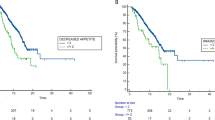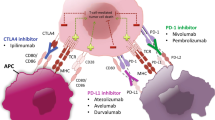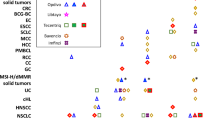Abstract
Purpose
Intestinal dysbiosis has emerged as a biomarker of response to immune checkpoint inhibitors (ICIs). It can be caused by antibiotics, although it may also result from the use of other drugs that have been studied to a lesser extent. The objective of our study was to analyze the association between the use of potentially dysbiosis-related drugs and survival in patients treated with ICIs in the clinical practice.
Materials and methods
A retrospective, multicenter, cohort study was conducted. Clinicopathological variables were collected and the concomitant use of drugs was analyzed. A descriptive analysis of variables and overall survival, estimated by the Kaplan–Meier method, was performed, and association with various independent variables was assessed using Cox regression.
Results
We included 253 patients, mainly with non-small cell lung cancer and melanoma. The most commonly used drugs were acid reducers, prescribed to 55.3% of patients, followed by corticosteroids (37.9%), anxiolytic drugs (35.6%), and antibiotics (20.5%). The use of acid reducers (9 vs. 18 months, P < .0001), antibiotics (7 vs. 15 months, P < .017), anxiolytic drugs (8 vs. 16 months, P < .015), and corticosteroids (6 vs. 19 months, P < .00001) was associated with poorer overall survival. Furthermore, the greater the number of drugs used concomitantly with ICIs, the higher the risk of death (1 drug: hazard ratio, 1.88; CI 95%, 1.07–3.30; 4 drugs: hazard ratio, 4.19; CI9 5%, 1.77–9.92; P < .001).
Conclusion
Response to ICIs may be influenced by the use of drugs that lead to intestinal dysbiosis. Although a confirmatory prospective controlled study is required, our findings should be taken into account when analyzing ICI efficacy.

Similar content being viewed by others
References
Garrett WS. Cancer and the microbiota. Science. 2015;348(6230):80–6.
Tan J. Immunotherapy meets microbiota. Cell. 2015;163(7):1561. https://doi.org/10.1016/j.cell.2015.12.009.
Robert C, Tomas L, Bondarenko I, et al. Ipilimumab plus dacarbacine for previously untreated metastatic melanoma. N Engl J Med. 2011;364:2517–26.
Larkin J, Chiarion-Sileni V, Gonzalez R, Grob JJ, et al. Combined nivolumab and ipilimumab or monotherapy in untreated melanoma. N Engl J Med. 2015;373(13):1270–1.
Ribas A, et al. Pembrolizumab versus investigator-choice chemotherapy for ipilimumab-refractory melanoma (KEYNOTE-002): a randomised, controlled, phase 2 trial. Lancet Oncol. 2015;16(8):908–18.
Robert C, Schachter J, Long GV, et al. Pembrolizumab versus ipilimumab in advanced melanoma. N Engl J Med. 2015;372:26.
Borghaei H, Paz-Ares L, Horn L. Nivolumab versus docetaxel in advanced nonsquamous non–small-cell lung cancer. N Engl J Med. 2015;373:1627–39.
Brahmer J, Reckamp KL, Baas P, et al. Nivolumab versus docetaxel in advanced squamous-cell non– small-cell lung cancer. N Engl J Med. 2015;373(2):123–35.
Reck M, Rodriguez-Abreu D, Robison A, et al. Pembrolizumab versus chemotherapy for PD-L1 positive non-small-cell lung cancer. N Engl J Med. 2016;10;375(19):1823–33.
Ferris RL, Blumenschein G Jr, Fayette J, et al. Nivolumab for recurrent squamous-cell carcinoma of the head and necK. N Eng J Med. 2016;375(19):1856–67.
Blank C, Haanen JB, Ribas A, Schumacher TN. The “cancer immunogram”. Science. 2016;353:658–60.
Viaud S, Saccheri F, Mignot G, et al. The intestinal microbiota modulates the anticancer immune effects of cyclophosphamide. Science. 2013;342(6161):971–6.
Vétizou M, Pitt JM, Daillère R, et al. Anticancer immunotherapy by CTLA-4 blockade relies on the gut microbiota. Science. 2015;350(6264):1079–84.
Sivan A, Corrales L, Hubert N, et al. Commensal Bifidobacterium promotes antitumor immunity and facilitates anti-PD-L1 efficacy. Science. 2015;350(6264):1084–9.
Routy B, Le Chatelier E, Derosa L, et al. Gut microbiome influences efficacy of PD-1-based immunotherapy against epitelial tumors. Science. 2018;359(6371):91–7.
Derosa L, Hellmann MD, Spaziano M, et al. Negative association of antibiotics on clinical activity of immune check-point inhibitors in patients with advanced renal cell and non-small-cell lung cancer. Ann Oncol. 2018;29:1437–44.
Iida N, Dzutsev A, Stewart CA, et al. Commensal bacteria control cancer response to therapy by modulating the tumor microenvironment. Science. 2013;342(6161):967–70.
Maier L, Pruteanu M, Kuhn M, et al. Extensive impact of non-antibiotic drugs on human gut bacteria. Nature. 2018;555:623–8.
Rogers MAM, Aronoff DM. The influence of nonsteroidal anti-inflammatory drugs on the gut microbiome. Clin Microbiol Infect. 2016;22:178.e1–9.
Jacckson MA, Goodrich JK, Maxan ME, et al. Proton pump inhibitors alter the composition of the gut microbiota. Gut. 2016;65:749–56.
Dominianni C, Sinha R, Goedert J, et al. Sex, body mass index, and dietary fiber intake influence the human gut microbiome. PLoS ONE. 2015;10(4):e0124599.
Forslund K, Hildebrand F, Nielsen T, et al. Disentangling the effects of type 2 diabetes and metformin on the human gut microbiota. Nature. 2015;528:262–6.
Matson V, Fessler J, Bao R, et al. The comensal microbiome is associated with anti-PD-1 efficacy in metastatic melanoma patients. Science. 2018;359:104–8.
Chaput N, Lepage P, Coutzac C, et al. Baseline gut microbiota predicts clinical response and colitis in metastatic melanoma patients treated with ipilimumab. Ann Oncol. 2017;28(6):1368–79. https://doi.org/10.1093/annonc/mdx108.
Freeman-Keller M, Kim Y, Cronin H, et al. Nivolumab in resected and unresectable metastatic melanoma: characteristics of immune-related adverse events and association with outcomes. Clin Cancer Res. 2016;22:886–94.
Conforti F, Pala L, Bagnardi V, et al. Cancer immunotherapy efficacy and patients’ sex: a systematic review and meta-analysis. Lancet Oncol. 2018;19(6):737–46. https://doi.org/10.1016/S1470-2045(18)30261-4Epub 2018 May 16.
Jakobsson HE, Jernberg C, Andersson AF, et al. Short-term antibiotic treatment has differing long-term impacts on the human throat and gut microbiome. PLoS ONE. 2010;5:e9836.
Arbour KC, Mezquita L, Long N, et al. Presented at the ASCO Meeting, Chicago, 2018. J Clin Oncol 36(suppl; abstr 9003).
Scott SC, Pennell NA. Brief report: early use of systemic corticosteroids in patients with advanced NSCLC treated with nivolumab. J Thorac Oncol. 2018. https://doi.org/10.1016/j.jtho.2018.06.004.
Kaderbhai C, Richard C, Fumet JD, et al. Antibiotic use does not appear to influence response to nivolumab. Anticancer Res. 2017;37:3195–200.
Horvat TZ, Adel NG, Dang TO, et al. Immune-related adverse events, need for systemic immunosuppression, and effects on survival and time to treatment failure in patients with melanoma treated with ipilimumab at Memorial Sloan Kettering Cancer Center. J Clin Oncol. 2015;33:3193–8.
Ko HH, et al. Statins: antimicrobial resistance breakers or makers? PeerJ. 2017;5:e3952. https://doi.org/10.7717/peerj.3952.
Acknowledgements
We appreciate the support of the Research Unit of the Agencia Sanitaria Costa del Sol for the translation of the manuscript.
Funding
None.
Author information
Authors and Affiliations
Contributions
Conceptualization: EPR, LCM, AR. Data curation: JJC, MABG, JV, SE, FT, MR, MG, RV, MJM, FRR, EN, CM, BPV. Formal analysis: FRR, EPR, AR. Investigation methodology: FRR, EPR, LCM, AR. Validation: EPR; JJC, MABG, JV, SE, FT, MR, MG, RV, MJM, FRR, EN, CM, BPV. Writing original draft: EPR, AR, LCM.
Corresponding author
Ethics declarations
Conflict of interest
There is no conflict of interest.
Ethical approval
The present study was approved by the Research Ethics Committee of Costa del Sol Hospital.
Informed consent
For this type of study, formal consent is not required.
Additional information
Publisher's Note
Springer Nature remains neutral with regard to jurisdictional claims in published maps and institutional affiliations.
E. Pérez-Ruiz, S. Estalella, F. Toscano, E. Nogales, C. Morales, B. Pérez-Valderrama, L. de la Cruz-Merino: On behalf of the Immunotherapy Subcommittee of the Andalusian Clinical Oncology Society (SAOM).
E. Pérez-Ruiz, F. Rivas-Ruiz: Health Service Research Network on Chronic Diseases (REDISSEC).
Electronic Supplementary Material
Below is the link to the electronic supplementary material.
Rights and permissions
About this article
Cite this article
Pérez-Ruiz, E., Jiménez-Castro, J., Berciano-Guerrero, MA. et al. Impact of intestinal dysbiosis-related drugs on the efficacy of immune checkpoint inhibitors in clinical practice. Clin Transl Oncol 22, 1778–1785 (2020). https://doi.org/10.1007/s12094-020-02315-9
Received:
Accepted:
Published:
Issue Date:
DOI: https://doi.org/10.1007/s12094-020-02315-9




